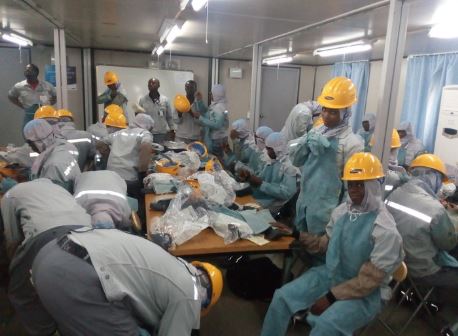
Samsung Heavy Industries of Nigeria (SHIN) has funded the cost of eye surgery for 102 Nigerian patients with cataracts. These patients who were at the risk of blindness have successfully recovered their eyesight with Vision Care, an organisation under the World Health Organisation (WHO).
SHIN’s intervention in Nigeria’s health sector is in addition to the giant contributions of the global giant in promoting Nigerian Content where young Nigerians get world class training and certification at the Welding Qualification Centre in Lagos as part of SHIN’s social contribution and Corporate Social Responsibility (CSR).
It was gathered that SHIN participated in a medical camp for cataract patients from October 8 to 12 at the Lagos State University Teaching Hospital (LASUTH) in Lagos State. Indeed, since 2015, Samsung has worked with Vision Care in the annual Eye Camp to give free cataract surgeries to individuals who cannot afford the treatment.
According to a statement by SHIN, 250 patients have received their eyesight from the previous camps.
The statement added that 102 cataract surgeries were successfully done in 2018. The Korean and Nigerian employees from SHIN, who have actively participated in the eye camp, have acquired the basic knowledge about ophthalmology through pre-orientation.
They actively assisted the medical staff in the overall medical treatment process such as patient reception, disinfection, injection
of eye drops, vision test, and helping the patients to wear a protective cap to ensure the operations went well even with
difficulties in the hospital, and the existing medical environment.
An employee from SHIN, Ifeyinwa, who assisted the medical staff in the operating room, said, “I did not know that there were so many cataract patients in Nigeria, and it was a wonderful feeling to assist in restoring eyesight to them. I am immensely proud of Samsung for doing such noble activities.”
Onyinye, who brought her sick brother with her mother, told journalists that, “My brother, Paul, has been impaired in his eyes and
ears since he was born. Thank you for letting him see the world after 15 years.”
When asked what he wanted to do the most right now, Paul’s face became excited and he indicated his willingness to get educated, he expressed this through sign language as if he was writing with a pencil.
SHIN has been supporting the cataract surgery of Vision Care for the fourth year running despite the difficult management environment.
Apart of this programme, as part of Samsung’s social contribution to the Nigerian community, SHIN has established a world-class Welding Qualification Centre in Lagos. This centre has trained 530 young Nigerians and they have received international certifications which they can use for many job opportunities.
Due to the success of the programme, structures have been put in place to ensure the center is lively and will keep providing high-end
technological transfer to Nigerian youths.
Nigeria’s mini-grid initiative to create $9.2bn market opportunities A new report has shown that the development of off-grid power
alternatives to complement the grid in Nigeria will create a $9.2 billion a year market opportunity for mini-grids and solar home
systems.
The report titled: “Minigrids in Nigeria: A Major Investment Opportunity”, is an independent assessment of the Nigerian mini-grid
market, was the outcome of a partnership between Rural Electrification Agency (REA), the World Bank (Energy Team) and Rocky Mountain Institute (RMI).
The REA is tasked with developing the Nigerian off-grid power market. The agency created the Off-Grid Electrification Strategy as part of the Power Sector Recovery Programme (PSRP). The strategy’s primary objective was to increase electricity access to rural and under-served clusters.
The PSRP is a series of policy actions, operational, governance and financial interventions to be implemented by the Federal Government over the next five years aimed at to restoring the financial viability of Nigeria’s power sector and improve its transparency and service delivery.
This will save $4.4 billion yearly for homes and businesses, the report said. The report described the country’s power generation as “poor quality, noisy, and polluting. It noted that this has led to several of the country’s commercially viable businesses being powered through expensive sources of power generation.
The report added that a significant amount of the economy is powered largely by small-scale generators (10–15 GW) with almost 50 per cent of the population having limited or no access to the grid.
Consequently, there are high densities of power use, large latent demand, and a strong willingness to switch to more-effective
alternatives.
“Getting off-grid solutions to scale and commercial viability in Nigeria will unlock an enormous market opportunity in Sub-Saharan
Africa across 350 million people in countries with smaller demand and/or less-robust economies,” the report said.
The initiative further seeks to resolve consumer complaints, reduce losses, energy theft, and reset the Nigerian electricity supply industry for future growth. The Federal Government developed the PSRP in collaboration with the World Bank Group.




